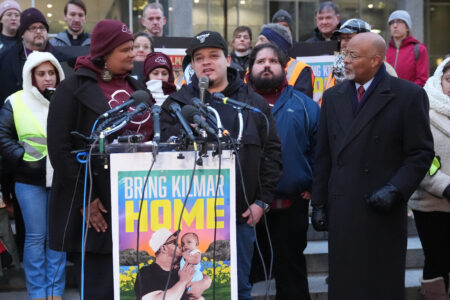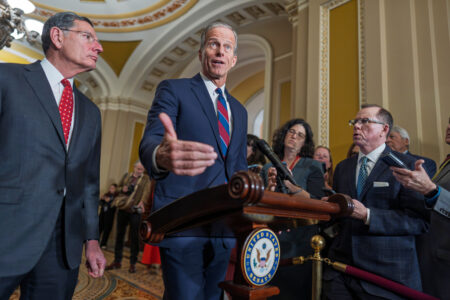For same-sex couples, domestic partnership just isn’t the same

Demonstrators protest Wednesday on the steps of the California Supreme Court in San Francisco against the State Supreme Court’s decision denying marriage to gay couples.
Sacramento, Calif. ? Yes, tying the knot gave them a huge emotional lift. But getting married also made practical sense to Paul Curtis and Ray Allen.
Marriage means more than just a ceremony and a certificate, according to legal specialists. It gives couples both gay and straight numerous rights and protections, having to do with everything from parenting to health care.
“It’s about being equal in the eyes of the law as well as culturally,” said Curtis, of Sacramento, who married his longtime partner in September, during a brief window of opportunity for gay couples in California.
The California Supreme Court last month upheld Proposition 8, which defines marriage as between a man and a woman, but it left the marriages of 18,000 gay couples intact.
Proponents of gay marriage have vowed to put the issue before voters again, possibly as early as next year.
‘Huge psychic difference’
California’s domestic partnership law already confers most of the same legal rights on gay couples as heterosexual married people, said professor Lawrence Levine of the McGeorge School of Law. Still, he said, marriage opens doors that domestic partnership does not.
“There is a shared understanding of what the word ‘marriage’ means in our culture,” Levine said. “There is a huge psychic difference between that word and the phrase ‘domestic partnership.'”
Even though the latter has legal heft in California, many people are unfamiliar with it, and as a result domestic partners may be denied their rights, Levine said.
“You either have to trust that people know what it means, or carry around the paperwork that proves your legal status,” he said.
Partnership ‘not as good’
Wendy Rae Hill of Sacramento and a previous girlfriend of seven years were registered domestic partners, but not everyone took their status seriously, Hill said.
“We got some protections,” she said, including the right of her partner to share Hill’s insurance benefits and the legal right to jointly parent two daughters. “But it definitely was not like being married. People didn’t really understand it.”
Hill, 34, and her partner of about a year, Carrie Tedrick, 31, live together in North Natomas and want to get married someday. “I have dreamed of a wedding my whole life,” Hill said. “But I don’t want to do it until it is fair, safe and available to everyone.”
Jenny Pizer, marriage project director for Lamda Legal, said domestic partnership is “viewed as different, and not as good” by the general public.
“As a domestic partner you may be entitled to equal treatment in a myriad of contexts,” Pizer said. “But the fact is that the paramedic or the clerk at the bank or the person behind the counter at the car rental place may not know that. The presumption of rights does not necessarily mean those rights will be honored.”
Even gay couples who recently have been able to marry sometimes have to prove their status with legal documents, she said. “Right now, there is no guarantee that married same-sex couples will be treated equally and respectfully.”
‘Legal approval’
Curtis, 55, and Allen, 43, who have been together since 2001, registered as domestic partners in the state in 2004 and held a “commitment ceremony” in Maui to mark the occasion. But marriage took them to a new level, Curtis said.
“The biggest difference is that we can say we are married, and everyone understands every single implication of that,” he said.
Marriage gives them the peace of mind of knowing that hospitals cannot prevent them from making medical decisions if one of them is unable to do so for himself. If they choose to have children, they each will have full legal rights as parents. They are able to share insurance benefits and save money by filing joint tax returns.
While California’s wedded gay couples are protected by state law, federal rights are another matter. The federal government recognizes marriage as only “a legal union of one man and one woman” as husband and wife.
“These folks are married in the eyes of the state, but in the eyes of the federal government they’re single,” Levine said. “It’s created a kind of double standard.”
That is why couples like Curtis and Allen must file separate federal tax returns, and cannot get certain credits given to heterosexual married couples. They have no rights to their partner’s Social Security, veterans or Medicare benefits. They cannot obtain legal residency for a partner who is an immigrant.
Despite all the complications, Curtis and Allen do have a somewhat exalted legal and cultural status as one of 18,000 couples who legally married in California between May and November, when voters passed Proposition 8.
“We have the legal approval of our government and civil rights that come with it,” Curtis said. “We also have cultural equality. To us, getting married felt really different from being in a domestic partnership.”







